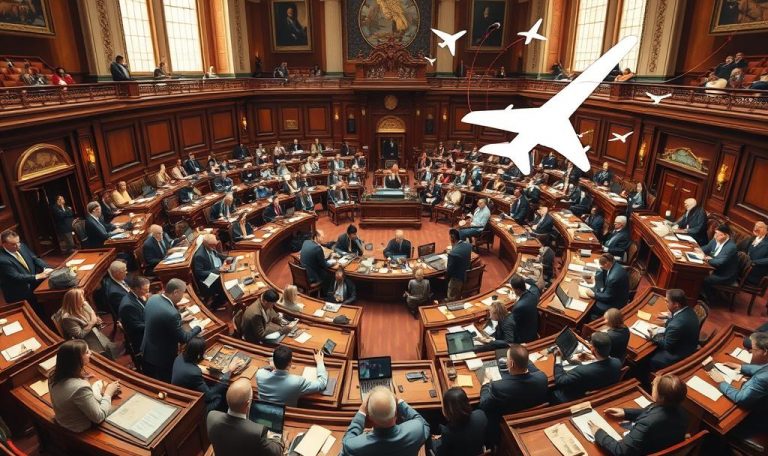The Legislative Assembly in Costa Rica has passed a bill to boost low-cost flights. This bill is supported by the Progressive Liberal Party (PLP). It has become popular, even though the ruling party was initially against it. They said it could harm the tourism industry.
The bill’s latest version was agreed upon by the PLP and the ruling party. This change shows a shift in politics. But, the industry is still split. Airlines and tourism groups worry about its effects on the economy and tourism.
Key Takeaways
- The Costa Rican Legislative Assembly has approved a bill to promote low-cost flights in the region.
- The ruling party initially opposed the bill, citing concerns over the impact on the tourism industry.
- Airlines and tourism associations have expressed concerns about the potential negative effects on the regional economy and tourism sector.
- The bill aims to make air travel more affordable for Central Americans and those traveling to the Dominican Republic.
- The political landscape has shifted, with the governing party and the Progressive Liberal Party reaching an agreement on the latest version of the bill.
Low-Cost Flight Bill Gains Momentum in Costa Rica – Industry Opposed
A new bill in Costa Rica wants to make flying cheaper across Central America. This idea is getting a lot of support, even though the aviation industry is against it.
Bill Aims to Promote Affordable Air Travel in Central America
The bill aims to control ticket and airport fees to help more people fly. It sets a cap of $100 for round-trip tickets to any Central American country. One-way tickets can cost up to $50.
It also limits airport fees and taxes to $23 per country. This includes both the country of departure and the destination.
Key Details: Maximum Ticket Prices and Airport Fees
For flights to the Dominican Republic, the bill sets a round-trip ticket cap at $120. One-way tickets can cost up to $60. These prices are meant to keep flying affordable for everyone.
| Destination | Maximum Round-Trip Ticket Price | Maximum One-Way Ticket Price | Maximum Airport Fees and Taxes |
|---|---|---|---|
| Central America | $100 | $50 | $23 per country |
| Dominican Republic | $120 | $60 | $23 per country |
The bill has started a big legislative debate in Costa Rica. The government wants to make flying cheaper. But, the aviation industry and others have concerns about the impact on costa rican aviation policy.
Ruling Party Initially Opposed Bill, Citing Tourism Concerns
Before the first debate on the low-cost flight bill in Costa Rica, the ruling party tried to stop it. Daniel Vargas, a member of the ruling party, suggested creating a special commission to study the bill. This was to address concerns from several tourism industry groups. But, his proposal didn’t get enough support, and 29 legislators voted for the bill, moving it forward.
The ruling party was worried about the bill’s impact on Costa Rica’s tourism industry. They thought the changes to aviation policy could upset the balance of the tourism sector. This could harm the industry, which is key to the country’s economy.
“We cannot ignore the concerns expressed by the tourism industry stakeholders. Their input is crucial in shaping policies that will affect their livelihoods and the overall economic well-being of the country.”
Despite the ruling party opposition at first, the bill started to gain support during the legislative debate. This showed lawmakers’ growing wish for cheaper air travel in Costa Rica. The bill will now face a second debate and a vote. A veto-proof majority is needed for it to pass into law.
Industry Opposition and Potential Negative Impacts
The debate over the low-cost flight bill in Costa Rica is growing. The industry is worried about the bill’s effects. Groups like the Costa Rican Airline Association (ALA), the Latin American and Caribbean Air Transport Association (ALTA), and the International Air Transport Association (IATA) oppose the bill.
Airlines and Tourism Associations Voice Concerns
The main worry is unfair competition. The ALA says the bill could make airlines less profitable. This might force them to cut routes or leave the country.
Fears of Harm to Tourism Sector and Regional Economy
The Guanacaste Chamber of Tourism Association (CATURGUA) is also worried. They think the law could hurt tourism and the local economy. They fear less air travel and airline cuts could harm tourism, which is key for economic growth.
| Stakeholder | Concerns |
|---|---|
| Costa Rican Airline Association (ALA) | Unfair competition and reduced airline profitability, leading to potential route cuts or airline exits |
| Latin American and Caribbean Air Transport Association (ALTA) | Negative impact on the air transport sector in Costa Rica |
| International Air Transport Association (IATA) | Concerns about the proposed bill’s effect on the industry |
| Guanacaste Chamber of Tourism Association (CATURGUA) | Potential harm to the tourism sector and regional economy due to reduced air connectivity |
“The potential consequences could be extremely detrimental to the tourism sector and the region’s economy.”
– Guanacaste Chamber of Tourism Association (CATURGUA)
Debate Over Free Competition and Price Controls
The proposed low-cost flight bill in Costa Rica has sparked a heated debate. It centers on free market competition and the use of price controls. Different groups agree that capping airfares could be seen as price control. This could limit competition and reduce new routes, affecting Costa Rica’s air connectivity.
Concerns About Limiting Free Market and Connectivity
Airlines and tourism groups have expressed their worries. They believe price controls could harm the free market and air connectivity in Costa Rica. They fear it could lead to less investment, fewer flights, and a drop in competition.
| Potential Impacts of Price Controls | Potential Impacts of Free Market Competition |
|---|---|
|
|
The debate highlights the delicate balance between affordable air travel and a thriving free market. This balance is crucial for Costa Rica’s air connectivity and aviation policy.
“Imposing a limit on airfares, regardless of the amount, could be considered price control, which would limit free competition, reduce the opening of new routes, and affect Costa Rica’s connectivity.”

President Chaves Threatens Veto, Citing Tourism Impact
Costa Rican President Rodrigo Chaves has made a bold statement. He warns that he will veto a new low-cost flight bill. He fears it could harm the country’s vital tourism industry.
The president’s veto threat shows the big risks in the debate on Costa Rican aviation policy. Chaves worries that the bill could badly hurt the tourism sector. This is a key part of Costa Rica’s economy.
“We cannot risk damaging the backbone of our economy – the tourism industry. This bill, if implemented, could have far-reaching negative implications that I cannot in good conscience support.”
Chaves’ stance makes the fight over the low-cost flight bill even more intense. Lawmakers must now get at least 38 votes to pass it. This shows how delicate the legislative process is. It highlights the need to balance different interests, like the tourism industry.
The debate is ongoing, with both sides watching the legislative process and the president’s veto threat closely. The outcome will affect the Costa Rican aviation policy and the country’s economy.
Next Steps and Upcoming Second Debate
The low-cost flight bill in Costa Rica is moving forward. It will face a second debate and vote in the Legislative Assembly. This is a key moment for the bill, which aims to make air travel more affordable in Central America.
Bill to be Voted on in Legislative Assembly
The bill has sparked a lot of debate. It’s set to be voted on next Thursday, unless there are any delays. This vote will be a turning point in the ongoing discussion.
Veto-Proof Majority Needed for Passage
To pass, the bill needs a veto-proof majority of 38 votes out of 57. This shows how contentious the bill is and the hurdles it faces in the legislative process.
The second debate and vote are crucial for the low-cost flight bill. Lawmakers will try to find a balance between affordable air travel and concerns from the Costa Rican aviation policy and tourism industry.
“This bill is a chance to improve air connections and make travel cheaper for everyone,” said a pro-bill spokesperson. “We understand the concerns from the industry and aim to find a fair solution.”
As the second debate nears, both sides will try to convince the veto-proof majority to pass the bill. The outcome will greatly affect Costa Rican aviation policy in the future.

Exploring Alternative Solutions and Promoting Dialogue
In Costa Rica, the debate over low-cost flights is ongoing. Airlines and tourism groups are looking for new ways to make travel affordable. They think there are better options than strict price limits.
The industry wants to talk to the law’s author and other key figures in Costa Rica. They aim to find alternative solutions that meet tourism needs and make air travel cheaper. This could lead to better air connections within the region.
One idea is to lower airport fees without controlling ticket prices. This regulatory approach might boost Costa Rican aviation policy. It could also make air travel within the region more sustainable, experts say.
Through this industry dialogue, everyone hopes to find a solution. It should benefit the Costa Rican tourism industry in the long run. The outcome could greatly affect air travel in the area.
| Proposed Alternative Solutions | Potential Benefits |
|---|---|
| Reducing airport rates and charges | Stimulating intra-regional air travel without price controls |
| Promoting industry dialogue with policymakers | Finding a balanced approach that addresses all stakeholder concerns |
| Exploring regulatory approach to Costa Rican aviation policy | Ensuring long-term sustainability of the tourism industry |
Impact on Costa Rican Tourism Board Funds
The proposed low-cost flight initiative in Costa Rica could significantly affect the Costa Rican Tourism Board (ICT). This change could alter the ICT’s budget and its marketing efforts in North America and Europe.
The ICT gets most of its funding from a tax on international flights to Costa Rica. This tax, called the “Tourism Promotion Tax,” is $29 per passenger. The low-cost flight bill aims to cap ticket prices, which could lower the tax revenue and the ICT’s funds.
Industry estimates suggest the ICT could lose up to $20 million annually if the bill passes. This loss would make it hard for the ICT to keep up its marketing and promotional activities. It could also hurt the tourism sector’s growth and visitor numbers.
| Metric | Current | Projected (with low-cost flight bill) |
|---|---|---|
| ICT Annual Budget | $50 million | $30 million |
| Tourism Promotion Tax Revenue | $40 million | $20 million |
| Projected Revenue Shortfall | – | $20 million |
The ICT’s funding could face big challenges with the low-cost flight bill. This could affect the costa rican tourism board funding, tourism promotion impact, and costa rican aviation policy. As the debate goes on, everyone will watch how it changes the tourism industry and the ICT’s role in promoting Costa Rica.
Regional Air Connectivity and Route Development
The debate over a low-cost flight bill in Costa Rica is ongoing. Industry experts worry about its effects on air travel and new routes. They believe a price cap could control prices, limit competition, and block new routes. This could harm the country’s air travel network.
Costa Rica’s aviation sector is key to its tourism. It helps people reach different places and boosts the local economy. Any changes could upset this balance, threatening Costa Rica’s status as a top tourist spot in Central America.
| Potential Impacts on Regional Air Connectivity | Potential Impacts on Route Development |
|---|---|
|
|
The government and industry are trying to find a solution. They aim to keep air travel affordable while protecting the country’s air network and route development. This is a big challenge.
“Any measures that limit free competition and restrict the opening of new routes could have a detrimental impact on our country’s overall connectivity and competitiveness in the aviation industry.”
The low-cost flight bill debate shows the need for balance. It’s important to keep air travel affordable and ensure the aviation industry’s future. Policymakers and stakeholders must carefully consider these factors.
Tourism Industry Dependence and Economic Impact
The proposed low-cost flight bill in Costa Rica has raised big worries in the tourism world, especially in coastal areas. Pilar Cisneros, a spokesperson for the ruling party, pointed out how much tourism is needed across the country.
Coastal Municipalities’ Concerns
Cisneros mentioned several coastal towns that strongly oppose the plan. They fear it will harm their tourism industry. “There are 187,000 families that depend directly on tourism, and I can’t understand how we can jeopardize this industry that feeds so many families directly, not to mention the indirect jobs,” she said.
Families Relying on Tourism Sector
The tourism sector in Costa Rica is key to the local economy, with many families counting on it. Cisneros’ words highlight the big effect any changes to Costa Rica’s aviation policy could have on thousands of families’ lives.
“There are 187,000 families that depend directly on tourism, and I can’t understand how we can jeopardize this industry that feeds so many families directly, not to mention the indirect jobs.”
The debate over the low-cost flight bill is ongoing. The worries of coastal towns and the impact on tourism-dependent families are key to the discussions and decisions ahead.
Conclusion
The debate over the low-cost flight bill in Costa Rica is complex. It’s about making air travel affordable while keeping tourism strong. The bill has made progress but faces opposition from airlines and tourism groups. They worry about its impact on the economy.
As the bill heads for another debate, people are looking for better solutions. They want to find a way that works for everyone. The goal is to improve air travel, encourage competition, and protect tourism, which is key to Costa Rica’s economy.
The result of this debate will affect Costa Rica’s aviation and tourism for years to come. By working together, policymakers and industry leaders can create a fair solution. This will help keep Costa Rica a thriving tourist spot.



